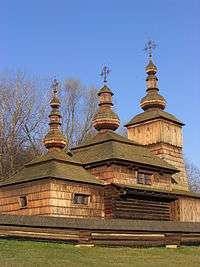Religion in Slovakia
Christianity is the predominant religion in Slovakia. The majority (62%) of Slovaks belong to the Latin Church of Catholicism; with the addition of a further 4% of Greek (Byzantine) Catholics, all Catholics account for 66%. Members of a Protestant denomination, mainly Lutheran or Reformed, account for 9%. Members of other churches, including those non-registered, account for 1.1% of the population. The Eastern Orthodox Christians are mostly found in Ruthenian (Rusyns) areas.[1] The Roman Catholic Church divides the country into 8 dioceses including 3 archdioceses in two different provinces. The Slovak Greek Catholic Church is a Metropolitan sui iuris Church with three Eparchies in Slovakia and one in Canada. Generally about one third of church members regularly attend church services.[2]
Other religions practiced in Slovakia include Bahá'í Faith, Hinduism, Islam, and Judaism. There are 18 registered churches and religions.[3] There were an estimated 0.2% Muslims in Slovakia in 2010.[4] While the country had an estimated pre-World War II Jewish population of 90,000, only about 2,300 Jews remain today.[5] In 2010, there were an estimated 5,000 Muslims in Slovakia representing less than 0.1% of the country's population.[6]
In 2016, Slovak parliament passed a bill that requires all religious movements and organizations to have a minimum of 50,000 verified practicing members in order to become state-recognized. The bill has been both well-received, as a method of curbing potentially dangerous and abusive new religious movements, and criticized for favoring Christianity and breaching the ideal of state secularism. The law passed by a two-third majority in the parliament.
Statistics
- St. Martin's Cathedral in Bratislava
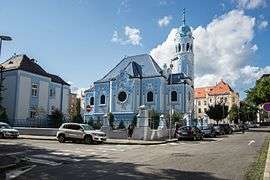 Church of St. Elizabeth, commonly known as Blue Church in Bratislava
Church of St. Elizabeth, commonly known as Blue Church in Bratislava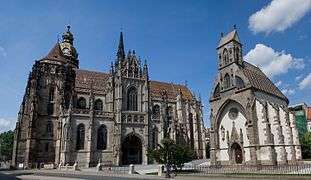
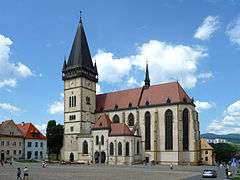 Basilica of St. Giles in Bardejov
Basilica of St. Giles in Bardejov.jpg) Basilica of St. James in Levoča
Basilica of St. James in Levoča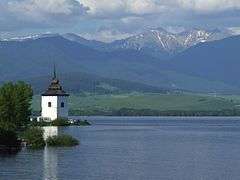 Church tower at Liptovská Mara
Church tower at Liptovská Mara
Religion in Slovakia (2011)[8]
| Denomination | Members | % |
|---|---|---|
| Roman Catholic Church | 3,347,277 | 62.0% |
| Evangelical Church of the Augsburg Confession in Slovakia | 372,858 | 5.9% |
| Greek Catholic Church | 206,871 | 3.8% |
| Reformed Christian Church | 98,797 | 1.8% |
| Czech and Slovak Orthodox Church | 49,133 | 0.9% |
| Jehovah's Witnesses | 17,222 | 0.3% |
| Evangelical Methodist Church | 10,328 | 0.2% |
| Not specified | 571,437 | 10.6% |
| No religion | 725,362 | 13.4% |
| Source: Slovakia census 2011 [9] | ||
Additionally, there are smaller numbers of adherents of various other Christian denominations: Baptists, The Brethren Church, Seventh-day Adventists, Apostolic Church, Evangelical Methodist, Old Catholic Church, Scientologists,[10] Christian Corps in Slovakia, and the Czechoslovak Hussite Church.[11][12] The largest pagan group in Slovakia is Krug Peruna. Moreover, it has members not only in Bratislava (its headquarters) but also in other cities such as Martin and Košice.
Religious freedom
The laws of Slovakia guarantee the freedom of religious belief, and criminalize the defamation of and discrimination against religious groups. Religious groups may register with the government in order to receive certain privileges, but the threshold of membership required for new groups to register is prohibitively high. Government officials have explicitly stated that preventing Islamic organizations from registering is a reason for this requirement. Christian groups have also complained that this membership threshold stymies the ability for individuals in registered religious organizations to dissent against their religious leadership.[13]
Politicians from far-right parties in the National Council, Slovakia's legislative body, frequently espouse Islamophobic and antisemitic rhetoric and conspiracy theories. Some of them have faced censure as a consequence of their violation of laws against the propagation of extremist materials and against affiliation with groups dedicated to the suppression of fundamental rights and freedoms.[13]
According to NGOs and unregistered religious groups, negative attitudes toward unregistered religious groups are prevalent, and there are significant amounts of hate speech online against religious minorities and refugees.[13]
See also
References
- Slovakia. Encyclopædia Britannica Online.
- Manchin, Robert (2004). "Religion in Europe: Trust Not Filling the Pews". Gallup. Retrieved Dec 4, 2009.
- Registrované cirkvi a náboženské spoločnosti v SR
- Pew Research Center (December 18, 2012). Religious Composition by Country 2010
- Vogelsang, Peter; Brian B. M. Larsen (2002). "Deportations". The Danish Center for Holocaust and Genocide Studies. Archived from the original on April 16, 2014. Retrieved April 26, 2008.
- Na Slovensku je 5-tisíc moslimov: Bude v našej krajine mešita? | Nový Čas. Cas.sk (2010-08-11). Retrieved on 2017-02-04.
- "St. Elisabeth Cathedral". Visitkosice.eu. Archived from the original on 4 August 2014. Retrieved 23 April 2014.
- "Table 14 Population by religion" (PDF). Statistical Office of the SR. 2011. Retrieved Jun 8, 2012.
- "Table 14 Population by religion" (PDF). Statistical Office of the SR. 2011. Retrieved Jun 8, 2012.
- A New Mission Opens in Štúrovo, Slovakia
- Results of the 2001 Slovak Census, from the Statistical Office of the Slovak Republic.
- Slovak Republic. International Religious Freedom Report 2005. USDOS.
- International Religious Freedom Report 2017 Slovak Republic, US Department of State, Bureau of Democracy, Human Rights, and Labor.

